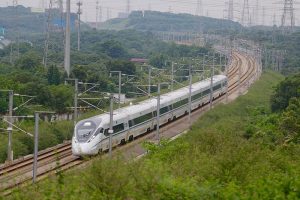 Vossloh Fastening Systems business unit has won a new rail fastening systems contract for the construction of a new high-speed line in China.
Vossloh Fastening Systems business unit has won a new rail fastening systems contract for the construction of a new high-speed line in China.
Under the contract with a value of EUR 30 million, Vossloh will start the deliveries in 2022.
The rail fastening systems are intended for a section of the planned high-speed line between the cities of Guiyang and Nanning in southern China. The high-speed line is planned to be taken into operation in 2023.
“We are very pleased that this order win will continue our success story in China, which has been ongoing for over a decade. This important order win fits seamlessly into our order trend, which has been very encouraging so far this year despite the COVID 19 pandemic, and clearly underlines the above-average crisis resistance of our company and our entire industry,” Oliver Schuster, Vossloh AG’s CEO said.
In 2019, the company has won a EUR 40 million rail fastening contract for the Hangzhou – Taizhou high speed line in south of Shanghai.
In 2018, Vossloh won three major contracts totalling EUR 85 million for the delivery of rail fastening systems used for the construction of China’s new high-speed railway lines.
Vossloh is active on China’s rail market since 2006. Its Kunshan-based Vossloh Fastening Systems China subsidiary supplies rail fastening systems, especially for country’s high-speed lines.
In the first half of 2020, Vossloh’s increasing earnings before interest and taxes (EBIT) came to EUR 30.1 million benefiting from a gain recognised in profit and loss resulting from a business combination achieved in stages of a joint venture in China in the Fastening Systems business unit totaling EUR 15.6 million; excluding this effect, EBIT came to EUR 14.5 million.
Orders received totaled EUR 187.4 million in the first half of 2020, down from the previous year’s high level of EUR 243.9 million as expected, the company said. The downturn was mainly due to the major orders which were won in the previous year in the Fastening Systems business unit in China and the Tie Technologies business unit in Australia. While orders received went down in the Fastening Systems business unit as the company expected, they went up significantly in the Tie Technologies business unit in the first six months of 2020, especially in the US in transit business and in Mexico.
Share on:



